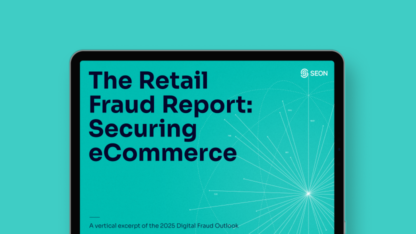In 2023 the World Bank cut its growth forecast to 1.7%, down from 2.9% just a year earlier. Where 2.9% begged the question, “Are we headed for a recession, then?”, 1.7% is firmly in “How do we weather this obvious recession?” territory.
Regardless of whether the largest finger gets pointed at knock-on effects from the ongoing war in Ukraine, the pandemic, or the fallout from the collapse of the FTX crypto exchange, businesses around the world should be plugging leaks in their bottom lines if they hope to stay afloat. For various reasons, times of economic downturn always lead to more fraudsters with needles, ready to poke.
Of course, even for companies proactively standing by with hot glue for leak-plugging, the first step is identifying where fraud is most likely to puncture your returns.
Financial Downturn, Fraud Upturn
Over ten years ago, following the 2007–2009 recession, the Association of Certified Fraud Examiners released its survey results, concluding that intense financial pressure during the economic crisis led to an increase in fraud.
Since then, the financial world has been heavily pressured to adopt digitization. Today many businesses handle correspondence and transactions primarily online, increasing their reach, but also presenting a larger digital attack surface for online fraudsters.
The combination of this extended attack surface and hard financial times inevitably make both people and businesses more vulnerable. Such an environment allows fraud that exploits these vulnerabilities to flourish. Consumers and businesses should know what to be on the lookout for.
For example, instances of authorized push payment (APP) fraud, scaled phishing attempts, and ad fraud will cost consumers and companies increasing billions in the coming year. Inside Intelligence reports that ad fraud alone will cost the global economy over $100 billion this year.
At the ground level, many people may have noticed an increase in phishing attempts on their personal devices. Texts that variously report an Apple wallet or PayPal account has been compromised and require re-verification are categorical attempts to skim personal information that can then be used to perform account takeover (ATO) fraud – a fraud method that has seen disproportionately large year-on-year growth compared to the growth of ecommerce itself.
On top of this, companies also have increased risk exposure to international regulators, particularly within the perimeter of AML and KYC mandates. High-profile cases of customer safety negligence, such as FTX, have made international legislators tighten existing enforcement measures. Last year, the UK’s FCA hit companies with over £200 million in KYC negligence fines. Meanwhile, AML fines soared over the $1.6 billion dollar mark last year.
Companies hoping to avoid opening themselves up to these kinds of risks should be adjusting their management strategies to handle the dangers that go alongside the recession climate.
How Has the Recession Impacted Fraud in the US?
Any alteration in the financial dynamics of a country provides opportunities for fraudsters to infiltrate businesses.
During times of economic hardship, many organizations reduce or even cut seemingly non-essential departments, in an effort to save money.
Small or new businesses with lower budgets feel increased pressure to save costs, even at the security or risk management level, which is making them more susceptible to attacks. On the other side of the coin, some larger organizations can underestimate the importance of up-to-date digital security and employee training, resulting in these essential teams downsizing.
Because of this, fraudsters who were previously foiled by security departments with higher budgets are often left with better opportunities to infiltrate vulnerable businesses. The consequences can involve anything from identity theft to account takeovers, data breaches and beyond.
At the height of the recession in 2009, the Federal Bureau of Investigations’ Internet Crime Complaints Center received 336,655 complaints of online crime – a 22.3% increase from the previous year. Total monetary losses were reported to be around $559.7 million, over double those of 2008.
In the years following the economic downturn, there was a consistent decline in the number of complaints of online crime. In 2013, that figure was around 262,813.
From 2014 to 2018 the number of complaints to the Center increased each year, with the total recorded number of complaints in 2018 being 351,938 – around 15,283 more than in 2009, during the recession.
When the most recent recession hit the United States in 2020, following the outbreak of COVID-19, the Bureau of Labor Statistics reported that unemployment reached its highest level, peaking at 14.7% in April.
In the same year, the number of complaints of online crime to the Internet Crime Complaints Center shot up to 791,790 – a 69.4% increase from the 467,361 complaints logged in 2019. The total monetary losses of online crime were reported to be over $4.2 billion in 2020, which is a 20% increase from the $3.5 billion estimated losses the previous year. Though exact data from the 2022 fiscal year is still coming in, an estimate by AtlasVPN puts the projection at $10.47 billion, representing a whopping increase of over 50% as the economic landscape entered the recession zone.
With such a close link between online crime and economic hardship, it is more essential than ever to protect your business against fraudsters. Corporate downsizing, for example, and a reduction of staff, including managers, can have detrimental effects on any corporation.
In such cases, the reduced workforce can be asked to take on tasks that fall outside of their scope of expertise and for which they may not have had risk mitigation training. Meanwhile, security teams can be neglected, with budget reductions providing criminals with increased opportunities.
How Has the Recession Impacted Fraud in the UK?
During a recession, people feeling the squeeze of inflation can be more financially vulnerable, and thus vulnerable to fraudsters. The 2008 recession saw a 2.1% fall in GDP and a 7.3% increase in fraud offenses in the UK.
When the cost of living becomes incrementally steeper, average people looking for new revenue streams might be more willing to turn a blind eye to too-good-to-be-true deals, or be more gullible when it comes to offers of quick easy money. These kinds of offers, on inspection, always turn out to be facets of criminal fraud enterprise.
At around the same time, the Office for National Statistics reported that the proportion of CSEW plastic card users who had been a victim of card fraud rose from 4% in 2006–07 up to 6% by 2009.
A report on cybercrime by the Home Office states that there was a decline in internet-enabled card-not-present fraud in the banks/payment card industry, from a peak of £181.7 million in 2008 to £135.1 million in 2010, when the economy was recovering from the recession. Digital transformation in the following years could have prompted the 2012 rise to £140.2 million.
Today, with the rising cost of energy, gas, food and rent, people across the country are pinching their pennies now more than ever. The Bank of England predicts that Consumer Prices Index (CPI) inflation is predicted to peak at 13.3% in October 2022.
Following past recessions, much of the economy has become digitized. Although it provides some security and decreased costs in the form of eliminating red tape and allowing for automated payments, this digital transformation increases the attack surface, no matter if it’s financial fraud, account takeovers or other schemes the fraudsters attempt.
Statistics confirm that online crime increases during a recession. ActionFraud reports that the total number of online fraud reports in 2021 totaled 865,622. While the report volume has not yet been published for 2022, in the UK Parliament’s Sixth Special Report of Session, the government acknowledged that enforcement authorities currently needed a new system of handling the volume of fraud reports, calling for the implementation of an automated system to streamline how that is executed – safe to say this indicates a year-on-year growth from 2021.
Meanwhile, the total amount of losses to online fraudsters rose from £2.35 billion in 2020–21, to £4 billion in 2022.
Inside of this alarming figure, it’s worth noting that, of the cases where over £100k was involved, the number of cases dropped 27% from 298 to 219, those cases represented a 151% climb, totaling £1.12 billion compared to £444.7 million the year before.
Compared to the previous year, 2022 proved most dangerous for the 30-39 age group, compared to 2021, in which the 20-29 age ground was most likely to be victimized.
How Can Businesses Be Safe from Recession Fraud?
As a business, there are simple steps you can take to safeguard your operations. They include more impactful strategies like comprehensive training for staff and updating your risk stack with more sophisticated solutions. That’s where fraud prevention companies like SEON can help, putting to good use the global shift towards the digital to stop fraud and crime without affecting the customer experience through digital footprint analysis, velocity checks, IP analysis, and more. To plug the inevitable leaks sprung by enterprising fraudsters, SEON provides risk teams with all the tools they need in both an automated and manual capacity.
How Can Individuals Be Safe from Recession Fraud?
As an individual, the best way to protect yourself from fraud in a recession is to be well aware of the risks and methods. There are plenty of reputable resources available online on websites as well as YouTube to learn the basics of keeping safe online.
Methodology
We wanted to find out how a recession can impact fraud, and provide advice on how individuals and businesses can protect themselves from fraud.
We sourced the number of complaints of online crime and the total dollar loss of online fraud each year from the Federal Bureau of Investigations’ Internet Crime Complaints Center’s annual reports.
We sourced the civilian unemployment rate in the United States from the Bureau of Labor Statistics, using the unemployment rate for April of each year.
Information on the cycle of fraud during a recession was sourced from PwC’s Fraud in a Downturn.
Information on fraud cases in the UK from 2019–20 and 2020–21 was sourced from ActionFraud.
Information on internet-enabled card-not-present fraud was sourced from the UK Home Office.







